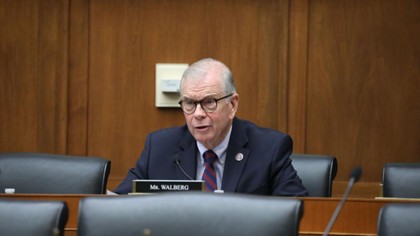Senate committee rejects bill aimed at explicit materials in schools
Democrats in the Senate Education and Health Committee narrowly voted down a bill aimed at controversial instructional materials in public schools — a political flashpoint that’s roiled local school boards and became a key issue in the Virginia governor’s race.
The legislation, which died Thursday in an 8-7 party-line vote, isn’t the only bill this session directed at addressing complaints about the content of books available through school libraries and assigned in classes. But the vote was a likely bellwether for the fate of similar legislation in the Democrat-controlled committee, whose members have pledged to block many Republican-backed measures on issues including teaching what Gov. Glenn Youngkin has called “divisive” concepts in schools.
Sponsored by Sen. Bill DeSteph, R-Virginia Beach, the legislation would have required local school boards to develop policies on the selection and evaluation of all “printed and audiovisual materials” available in school libraries and required parental permission before any student could check out a book involving sexual content. The bill also would have required local school boards to develop policies for handling “controversial instructional material.”
The initial bill would have also required school libraries to remove books that could be considered “grooming materials,” a defined term in Virginia code related to depictions of children engaged in sexual acts in the context of child pornography or soliciting minors for sex. Libraries, museums and works of art are exempt from the code section, but DeSteph — who began hearings for the bill by distributing excerpts from books he considered objectionable — used the term to describe texts such as “The Bluest Eye” by Toni Morrison and the graphic novel “Gender Queer,” which explores nonbinary gender identity and includes two depictions of LGBTQ sexual experiences.
Spotsylvania County made national headlines after banning all sexually explicit books from school libraries, only to reverse the decision a week later. And Youngkin made controversial texts a core issue in the final days of his campaign, running a political advertisement featuring a Fairfax County mother who petitioned the district to ban Toni Morrison’s Pulitzer Prize-winning novel “Beloved” — assigned in her son’s high school Advanced Placement course.
Like Youngkin, DeSteph and other supporters framed the bill as an important protection of parental rights. “This last election showed us that parents want to have more control about what is happening in their schools,” said Sen. John Cosgrove, R-Chesapeake, in a Thursday committee meeting. “We all watched that election and we all know why the governor is sitting in that mansion right now.”
Opponents of the legislation, though — including Democratic committee members, the Virginia Education Association, the Virginia Association of School Superintendents, the Virginia School Boards Association and the Virginia Association of School Librarians — raised a range of logistical and ideological concerns with the bill over two contentious hearings.
Before the legislation was amended, school librarians worried that the parental involvement and public comment period provisions — mandated in the original draft but with no clear guidance on how either should be structured — would delay the tight timeline for adding new books to libraries over the summer. Even without those requirements, many said the bill was redundant given that school librarians are trained to vet and approve texts, and that parents can already ask their local school boards to review any books they find controversial.
(Editor’s Note: This article first appeared in the Virginia Mercury. Republished with permission)



